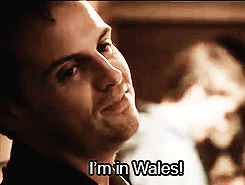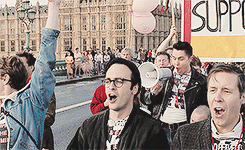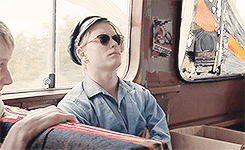9 Reasons Why “Pride” Is the Perfect Study Break
With the semester rapidly drawing to a close, we’re all looking for ways to procrastinate (er, take well-deserved study breaks) that we can justify as at least minimally productive or educational. Pride (2014), an independent British film with a kick-ass ensemble cast, gets my vote. Here’s why:
1. The film follows a London-based group, Lesbians and Gays Support the Miners (LGSM), and the Welsh mining community the group comes to support during the UK miners’ strike of 1984-1985. If you want a fun crash course in British history or working class or LGBT rights movements—while singing along to a fantastic soundtrack (because all social movements need anthems)—every minute of this two-hour film is gold. Many of the characters are based on the real-life individuals who made up this unprecedented partnership. We talk a lot at Scripps about intersectionality: this is the real deal.
2. The film opens with Mark Ashton (Ben Schnetzer) coming up with the initial idea to raise funds for the miners—while completely ignoring the boy who spent the night. As he leaves his flat, he responds to a neighbor’s complaint about his “deviant activities” and threat to send a policeman with a cheeky, “Oh, I do hope so!”
3. When LGSM visits their adopted village, many of the villagers are hesitant to accept them at the union lodge, where the organizing and socializing occur. One evening, the female villagers are dancing, while the men sit and nurse their beers. When Jonathan (the oldest LGSM member) asks the women about this, they reply, “Welsh men don’t dance!” Jonathan rushes to the DJ, convinces him to put on “Shame, Shame, Shame,” and dances exuberantly with half a dozen of the village women.
The village men look on in astonishment as “their” women clearly have the time of their lives… and eventually, a few of the young men gather up enough courage to as Jonathan for dance lessons, figuring that they can sit at the bar and never have the guts to ask their crushes out, or they can learn a skill that their would-be beloveds clearly admire. Life is so much more fun when you’re able to rid yourself of strict gender norms.
4. As the miners and villagers begin to talk, the villagers have a fair amount of questions for their London comrades. As one woman begins to ask a question of a gay couple, the men interrupt her, saying, “We know what you’re going to ask.” They think she’s going to ask a question regarding sexual positions. What she actually wants to know, however, is who does the housework. Sometimes, of course, the villagers want to know about sex (and veganism)… sometimes, they just want to know how household dynamics shift when there isn’t one person who would “obviously” be in charge of the dusting.
5. Siân James (Jessica Gunning) is a housewife whose family is relatively new to the village. Her husband—one of the striking miners—encourages her to become involved in the relief effort, although he’s more than a little startled when she goes head-to-head with committee members regarding inviting LGSM to the village on her first volunteer shift. She quickly becomes a leader of the pro-LGSM villagers, but she tells Jonathan that, after the strike, she’ll go back to being a wife and mother. Jonathan urges her not to waste her potential. Real-life Siân goes on to become a member of Parliament—and the first woman to represent her district. Damn.

6. Joe (George MacKay), a young man from a middle class family who is just coming to terms with his sexuality, is the fictional audience surrogate of the film. While in the beginning of the film, he’s hesitant to become visibly involved, he gradually takes on more leadership roles in LGSM. It’s a beautiful portrayal of how people can grow when they are in communities that believe in them and love them for who they are.
7. Gethin (Andrew Scott) is Jonathan’s boyfriend and is originally from Wales—although he hasn’t been back in 16 years. It’s kind of hard to believe this character’s bittersweet arc is played by the same actor who won a BAFTA for playing Sherlock’s good old-fashioned villain. 
8. You can walk into almost any movie theater and watch a film about romantic love. And while there is romantic love in “Pride,” there is also an enormous amount of friendship and love in general. Through your tears, I promise you’ll be smiling so hard it hurts.

9. If you don’t believe my clear obsession with these characters, believe the industry. Pride won the Queer Palm award at the 2014 Cannes Film Festival, a Best British Independent Film Award, and a BAFTA (for outstanding debut for a British writer, director, or producer).
Solidarity forever.

![[in]Visible Magazine](https://community.scrippscollege.edu/invisible/wp-content/uploads/sites/5/2011/04/Invisible-Masthead-2011-Spring1.png)












Comments are closed.